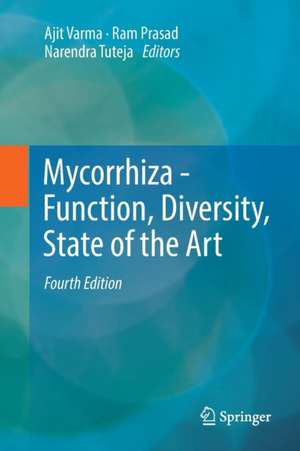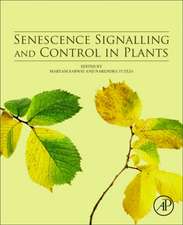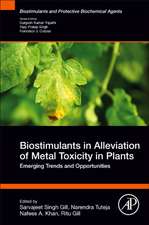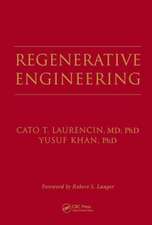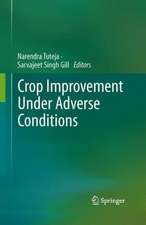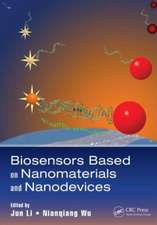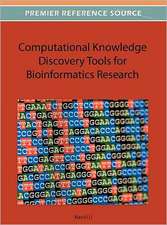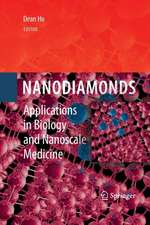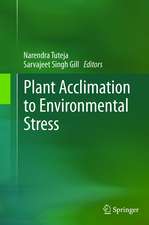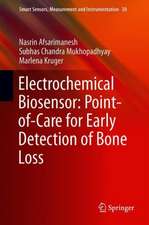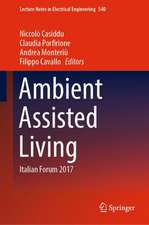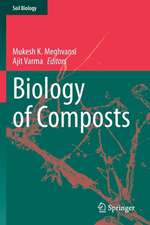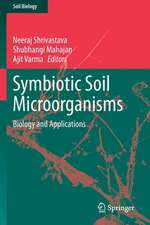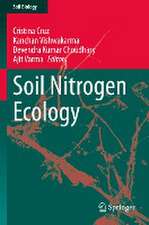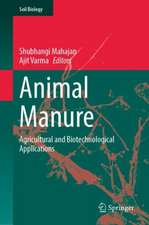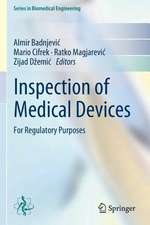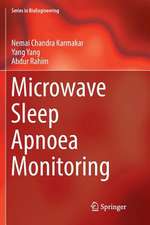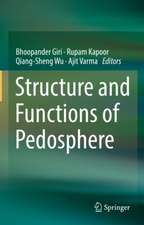Mycorrhiza - Function, Diversity, State of the Art
Editat de Ajit Varma, Ram Prasad, Narendra Tutejaen Limba Engleză Paperback – 28 iul 2018
This book is an up-to-date overview of current progress in mycorrhiza and association with plant productivity and environmental sustainability. The result is a must hands-on guide, ideally suited for agri-biotechnology, soil biology, fungal biology including mycorrrhiza and stress management, academia and researchers.
The topic of this book is particularly relevant to researchers involved in mycorrhiza, especially to food security and environmental protection.
Mycorrhizas are symbioses between fungi and the roots of higher plants. As more than 90% of all known species of plants have the potential to form mycorrhizal associations, the productivity and species composition and the diversity of natural ecosystems are frequently dependent upon the presence and activity of mycorrhizas. The biotechnological application of mycorrhizas is expected to promote the production of food while maintaining ecologically and economically sustainable production systems.
| Toate formatele și edițiile | Preț | Express |
|---|---|---|
| Paperback (1) | 1385.67 lei 6-8 săpt. | |
| Springer International Publishing – 28 iul 2018 | 1385.67 lei 6-8 săpt. | |
| Hardback (1) | 1391.83 lei 6-8 săpt. | |
| Springer International Publishing – 22 mai 2017 | 1391.83 lei 6-8 săpt. |
Preț: 1385.67 lei
Preț vechi: 1689.85 lei
-18% Nou
Puncte Express: 2079
Preț estimativ în valută:
265.14€ • 276.86$ • 218.95£
265.14€ • 276.86$ • 218.95£
Carte tipărită la comandă
Livrare economică 15-29 aprilie
Preluare comenzi: 021 569.72.76
Specificații
ISBN-13: 9783319850528
ISBN-10: 3319850520
Ilustrații: XVI, 396 p. 61 illus., 50 illus. in color.
Dimensiuni: 155 x 235 mm
Greutate: 0.58 kg
Ediția:Softcover reprint of the original 4th ed. 2017
Editura: Springer International Publishing
Colecția Springer
Locul publicării:Cham, Switzerland
ISBN-10: 3319850520
Ilustrații: XVI, 396 p. 61 illus., 50 illus. in color.
Dimensiuni: 155 x 235 mm
Greutate: 0.58 kg
Ediția:Softcover reprint of the original 4th ed. 2017
Editura: Springer International Publishing
Colecția Springer
Locul publicării:Cham, Switzerland
Cuprins
1 Introduction to Mycorrhiza: Historical Development.- 2 Mobilization of Micronutrients by Mycorrhizal Fungi.- 3 Soil: Do Not Disturb, Mycorrhiza in Action.- 4 Mycorrhiza-Creating Good Spaces for Interactions.- 5 Mycorrhizal Helper Bacteria: Sustainable Approach.- 6 Mycorrhization of Fagaceae Forests within Mediterranean Ecosystems.- 7 ECTOMYCORRHIZA: Their Diversity, Ecology and Practical Applications.- 8 Plant Flavonoids: Key Players in Signalling, Establishment and Regulation of Rhizobial and Mycorrhizal Endosymbioses.- 9 Mycorrhizas in Forest Tree Health.- 10 Ectomycorrhizal Fungi: A Major Player in Early Sucession.- 11 Truffle Ecology: Genetic Diversity, Soil Interactions and Functioning.- 12 Inter- and Intraspecific Fungal Diversity in The Arbuscular Mycorrhizal Symbiosis.- 13 Arbuscular Mycorrhizal Fungi and Dark Septate Endophytes in Grapevine: the Potential for Sustainable Viticulture?.- 14 What Have We Learnt from Studying Mycorrhizal Colonisation of Wetland Plant Species?.-15 Response of Arbuscular Mycorrhizal Fungi To Global Climate Change and Their Role in Terrestrial Ecosystem C and N Cycling.- 16 Arbuscular Mycorrhizal Fungi in Hypoxic Environments.- 17 Piriformospora indica (Serendipita indica) -The Novel Symbiont.- 18 Mass Cultivation of Mycorrhiza-like fungus Piriformospora indica (Serendipita indica) by Batch in Biorector.
Recenzii
“Periodic syntheses are essential to provide overviews of just where particular areas of research are today, and that is accomplished here in 18 chapters involving 45 authors drawn from 11 countries. … The book is nicely produced, with some coloured figures distributed though the text … . a collection of mainly potentially stand-alone chapters on particular aspects of mycorrhizal research … . Mycorrhizal researchers will consequently use this as a source for reviews of the selected subjects covered … .” (IMA Fungus, Vol. 8 (1), 2017)
Notă biografică
Prof Dr Ajit Varma: Ajit Varma has completed his PhD at the age of 25 years from Allahabad University and Former Professor, School of Life Sciences, Jawaharlal Nehru University, India. Presently, he is the Distinguished Scientist & Professor of Eminence of Amity Institute of Microbial Technology; Pro-Vice Chancellor, Ritnand Balved Education Foundation, and Vice Chairman, Amity Science, Technology & Innovation Foundation Amity University Uttar Pradesh, India. He has published more than 314 papers. Ajit Varma is the Fellow of Alexander-von-Humboldt Society, Germany, elected Fellow of National Academy Agricultural Sciences and Fellow of Microbiology Society of India.
Ajit Varma is also series editor of the Springer series "Soil Biology".
Dr Ram Prasad: Assistant professor at Amity Institute of Microbial technology, Amity University, Noida, India. He is working on plant microbe interaction, nanobiotechnology, and microbial biotechnology including fungal biology. Ram Prasad has edited several books and has published a number of research papers and review articles to his credit in international journals. During 2014, Ram Prasad has been awarded American Cancer Society UICC International Fellowship for Beginning Investigator, USA.
Prof Dr Narendra Tuteja: An elected fellow of numerous academies and visiting scientists at ICGEB, New Delhi, he is currently Director and Head of Amity Institute of Microbial technology, Amity University, Noida, UP, India. Narendra Tuteja has made significant contributions to crop improvement under adverse conditions, reporting the first helicase from plant and human cells and demonstrating new roles of Ku autoantigen, nuclolin and elF4A as DNA helicases. Narendra Tuteja also reported several high salinity stress tolerant genes from plant and fungi and developed salt/drought tolerant plants.
Ajit Varma is also series editor of the Springer series "Soil Biology".
Dr Ram Prasad: Assistant professor at Amity Institute of Microbial technology, Amity University, Noida, India. He is working on plant microbe interaction, nanobiotechnology, and microbial biotechnology including fungal biology. Ram Prasad has edited several books and has published a number of research papers and review articles to his credit in international journals. During 2014, Ram Prasad has been awarded American Cancer Society UICC International Fellowship for Beginning Investigator, USA.
Prof Dr Narendra Tuteja: An elected fellow of numerous academies and visiting scientists at ICGEB, New Delhi, he is currently Director and Head of Amity Institute of Microbial technology, Amity University, Noida, UP, India. Narendra Tuteja has made significant contributions to crop improvement under adverse conditions, reporting the first helicase from plant and human cells and demonstrating new roles of Ku autoantigen, nuclolin and elF4A as DNA helicases. Narendra Tuteja also reported several high salinity stress tolerant genes from plant and fungi and developed salt/drought tolerant plants.
Textul de pe ultima copertă
This is the fourth updated and revised edition of a well-received book that emphasises on fungal diversity, plant productivity and sustainability. It contains new chapters written by leading experts in the field.
This book is an up-to-date overview of current progress in mycorrhiza and association with plant productivity and environmental sustainability. The result is a must hands-on guide, ideally suited for agri-biotechnology, soil biology, fungal biology including mycorrrhiza and stress management, academia and researchers.
The topic of this book is particularly relevant to researchers involved in mycorrhiza, especially to food security and environmental protection.
Mycorrhizas are symbioses between fungi and the roots of higher plants. As more than 90% of all known species of plants have the potential to form mycorrhizal associations, the productivity and species composition and the diversity of natural ecosystems are frequently dependent upon the presence and activity of mycorrhizas. The biotechnological application of mycorrhizas is expected to promote the production of food while maintaining ecologically and economically sustainable production systems.
This book is an up-to-date overview of current progress in mycorrhiza and association with plant productivity and environmental sustainability. The result is a must hands-on guide, ideally suited for agri-biotechnology, soil biology, fungal biology including mycorrrhiza and stress management, academia and researchers.
The topic of this book is particularly relevant to researchers involved in mycorrhiza, especially to food security and environmental protection.
Mycorrhizas are symbioses between fungi and the roots of higher plants. As more than 90% of all known species of plants have the potential to form mycorrhizal associations, the productivity and species composition and the diversity of natural ecosystems are frequently dependent upon the presence and activity of mycorrhizas. The biotechnological application of mycorrhizas is expected to promote the production of food while maintaining ecologically and economically sustainable production systems.
Caracteristici
The fourth updated, enlargend, and revised edition of the successful monograph on mycorrhiza - now in three volumes! With a strong emphasis on latest findings in the role of mycorrhiza in food security and environmental protection Up-to-date overview of current progresses in mycorrhiza and their association with plant productivity and environmental sustainability A must hands-on guide, ideally suited for agri-biotechnology, soil biology, fungal biology including mycorrrhiza and stress management, academia and researchers Chapters include recent updated illustrative figures and tables Includes supplementary material: sn.pub/extras
